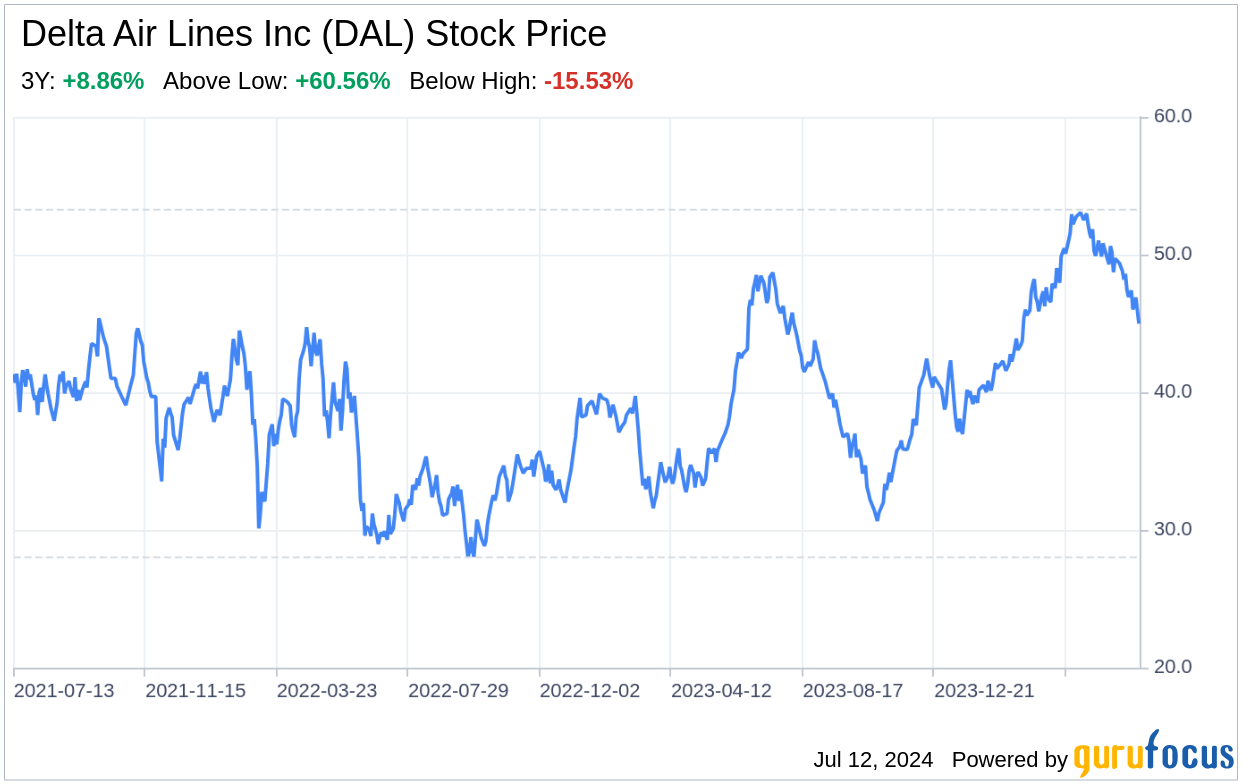On July 11, 2024, Delta Air Lines Inc (DAL, Financial), an Atlanta-based global aviation leader, submitted its 10-Q filing, revealing a comprehensive overview of its financial health and strategic positioning. With a vast network spanning over 300 destinations in more than 50 countries, Delta's hub-and-spoke model continues to optimize global passenger distribution. The recent filing underscores Delta's financial resilience, with a notable increase in cash and cash equivalents from $2,741 million to $4,110 million, and a solid uptick in passenger revenue from $23,616 million to $24,972 million for the six months ended June 30. This SWOT analysis delves into the strengths, weaknesses, opportunities, and threats as presented in the filing, providing investors with a nuanced understanding of Delta's market trajectory.

Strengths
Robust Financial Performance and Liquidity: Delta's financial acumen is evident in its substantial liquidity and improved net income. The company's cash and cash equivalents surged to $4,110 million, up from $2,741 million at the end of the previous year. Moreover, Delta reported a strong net income of $1,305 million for the quarter ended June 30, 2024, compared to $1,827 million in the same period last year, showcasing its ability to generate profits despite market fluctuations.
Expansive Global Network: Delta's extensive global network is a cornerstone of its strength. The airline's strategic hubs, including Atlanta and New York, facilitate efficient passenger flow and connectivity. This network breadth allows Delta to capture a significant market share in international travel, particularly over the Atlantic, contributing to its leading position in the industry.
Weaknesses
High Operating Expenses: Despite robust revenue growth, Delta's operating expenses have also risen, with total operating expense for the quarter ending June 30, 2024, increasing by 10% year-over-year. Salaries, aircraft fuel, and related taxes remain significant cost drivers, potentially impacting the company's profitability and pricing competitiveness.
Fleet Age and Maintenance: Delta's fleet, while sizable, includes older aircraft that may require more maintenance and could be less fuel-efficient than newer models. This could lead to increased operational costs and a need for significant capital investment to modernize the fleet, posing a challenge to maintaining cost efficiency.
Opportunities
Fleet Modernization and Expansion: Delta has committed to future aircraft purchase commitments totaling approximately $19.9 billion, signaling an opportunity for fleet modernization and expansion. This strategic move can enhance fuel efficiency, reduce maintenance costs, and improve customer experience, positioning Delta for future growth.
Technological Advancements and Customer Experience: Delta has the opportunity to leverage technological innovations to enhance the customer experience. Investments in digital platforms, in-flight entertainment, and personalized services can differentiate Delta in a competitive market and drive customer loyalty.
Threats
Volatile Fuel Prices: Fluctuating fuel prices remain a constant threat to Delta's operating margins. While the company has hedging strategies in place, significant volatility in fuel costs can adversely affect profitability and necessitate adjustments in pricing and operations.
Regulatory and Geopolitical Risks: As an international carrier, Delta faces regulatory and geopolitical risks that can disrupt operations and affect demand. Changes in trade policies, visa regulations, and geopolitical tensions can impact international travel patterns and pose a threat to Delta's global network.
In conclusion, Delta Air Lines Inc (DAL, Financial) demonstrates financial robustness and strategic acumen in its latest SEC filing. The company's strengths lie in its solid financial performance, expansive network, and customer-centric approach. However, it must navigate the challenges of high operating expenses and fleet maintenance. Opportunities for growth emerge through fleet modernization and technological advancements, while threats from volatile fuel prices and regulatory changes loom. Overall, Delta's strategic initiatives and forward-looking investments suggest a resilient outlook in the face of industry headwinds.
This article, generated by GuruFocus, is designed to provide general insights and is not tailored financial advice. Our commentary is rooted in historical data and analyst projections, utilizing an impartial methodology, and is not intended to serve as specific investment guidance. It does not formulate a recommendation to purchase or divest any stock and does not consider individual investment objectives or financial circumstances. Our objective is to deliver long-term, fundamental data-driven analysis. Be aware that our analysis might not incorporate the most recent, price-sensitive company announcements or qualitative information. GuruFocus holds no position in the stocks mentioned herein.
